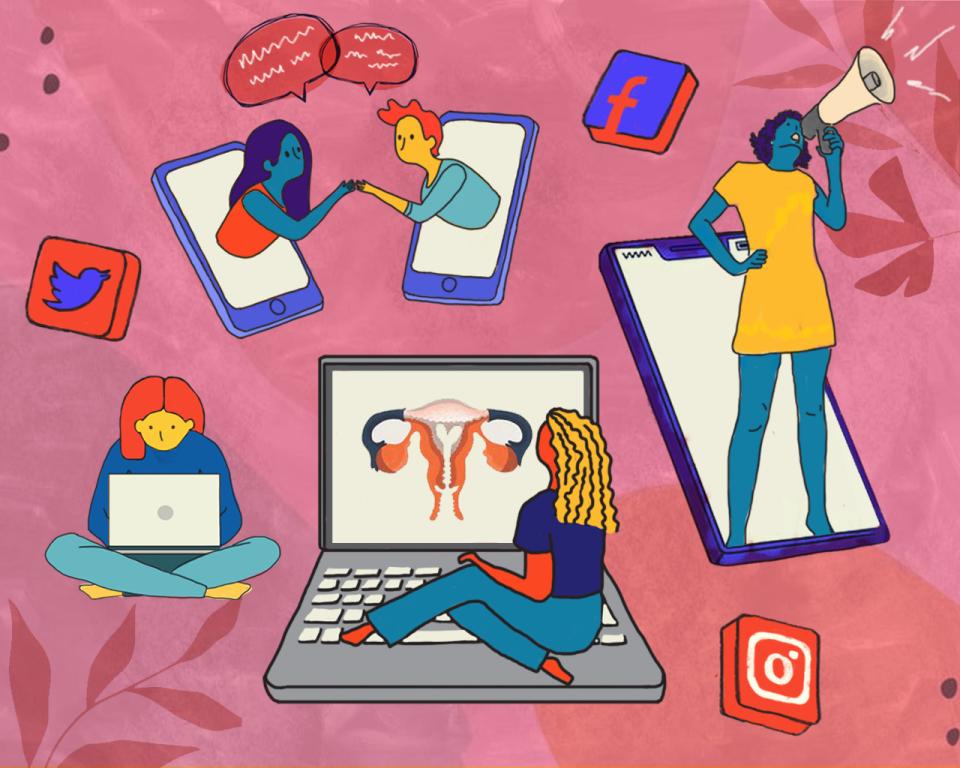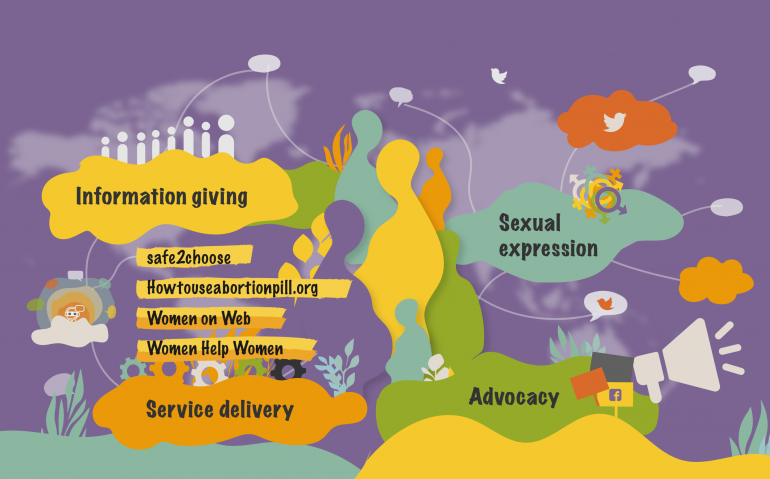
Illustration of five women engaging with various devices to access or amplify abortion related information. Illustration by Paru Ramesh
In April 2022, the Indian government launched the Digital Health Mission under its Digital India programme. The Digital Health Mission, also known as Ayushman Bharat Digital Mission, aims to digitise the healthcare system of the country. It intends to give every citizen an Ayushman Bharat Health Account (ABHA) number. Medical records of every individual will be stored digitally in a central database, including sensitive information like termination of pregnancy, seeking care for sexually transmitted diseases etc. ABHA number will also be connected to each person’s respective Aadhaar number. Aadhaar is the world’s largest biometric ID system, and the Aadhaar number is linked to the individual’s demographic and biometric information such as address, phone number, fingerprints and iris scans, and this data is stored in a centralised database. When it is not technically mandatory to produce one’s Aadhaar or link it to welfare services, in practice it is for all intents and purposes. In the past, persons living with HIV were forced to discontinue treatment as care was contingent on them providing Aadhaar details, which caused fear of their identities being revealed. A report published by Behan Box explored instances when women had to seek unsafe abortion as they were denied safe abortion by healthcare providers for not furnishing their Aadhaar.
The linking of ABHA and Aaadhaar will be a big barrier for abortion seekers to access abortion services confidentially. India is a country that does legally allow abortion under specific conditions, which are the continuance of pregnancy causing grave injury to physical or mental health of woman, pregnancy caused by rape, the continuance of pregnancy being a risk to the life of pregnant woman and in case of fetal anomalies. The law is by no means inclusive and rights-based, but the additional stigma related to abortion and social norms on family’s control over women’s fertility and body makes it harder for people to access it. Since the ABHA number will be linked to the Aadhaar card, and by default phone number and all other identifiers, ABHA accounts could make it easier for controlling family members/partners and the government to surveil women and queer persons.
On June 3, the government of Poland introduced a plan to create a national pregnancy registry; all hospitals and health centers in the country will be mandated to maintain digital records of pregnant persons. In Poland, abortion is legal only when it is a risk to the health or life of a woman or when pregnancy results from a rape. In my conversation with Ivette Mrova, a European abortion rights activist working with Women Help Women - a non-profit working to make abortion accessible, she said, “The pregnancy registry is essentially digitising the paper patient card to make it e-patient card as there is insistence from the European Union to digitise health data.” She says that the problem in digitising this data is the distrust between the people and the authorities. “Due to a restrictive law on medical termination of pregnancy, people do not trust neither the government authorities who will maintain the pregnancy registry data nor the doctors or service providers."
Mrova adds, “The doctors deny providing abortion because of the restrictive law. It is denied even if people qualify for legal abortion. Even though seekers have not been prosecuted, the problem is that there is a larger atmosphere of fear since there is an authoritarian-like government. So people do not trust that the information collected will not be used against them in the future. Therefore, people are protesting against the pregnancy registry."
What we see today in the government programmes around the world is a huge push towards mass digitising of the healthcare, including abortion and reproductive and sexual healthcare. In countries such as India and Poland, there are perpetual attempts by the state to issue digital ID cards for maintaining health records. The abortion laws in both the countries are quite different, but the issue of digitising sexual healthcare in an atmosphere of distrust between abortion service seekers and the government is quite similar. It is the figure of big brother watching us, so privacy from the government is increasingly becoming a myth. Not just that, like I said before, harassment and breach of privacy from family members and partners is not a difficult scenario to imagine.
Talking about privacy and abortion from the tech companies, in the US, Safe Graph, a location data company was reported to be selling location data of abortion seekers in the form of aggregated data to whoever is interested. Location data is hugely in demand for verifying certain trends and patterns. If companies like Safe Graph have access to this data, they can even sell it to anti-abortion groups to advocate against safe abortion. Moreover, Vice reported that it is not difficult to identify individuals from aggregated data collected by companies through mobile phones and other devices due to the expansiveness of big data systems. A 2019 study also confirmed that anonymised data is not completely anonymous, and can identify the person the data belongs to.
The other challenge we face in the abortion rights movement is censorship by social media companies. Very recently, safe2choose, a YouTube page run by Women First Digital was shut down by YouTube for “violating their community guidelines.” In my discussion with Michell Mor, Digital Strategist, Women First Digital, she says, “this is not the first time YouTube shutdown our page. It happened in 2018 once when they said that our content is triggering other people to harm themselves. In 2021, we started our new account, which had approximately 500 followers. But it was closed again in May 2022. The second time we made an appeal to restore the account, YouTube just sent an auto-generated message saying that you can only appeal once."
YouTube’s community guidelines do not allow posting content related to suicide and self-harm. But it is difficult to imagine how scientifically accurate information on abortion is construed as harmful. If anything, it is to protect people from harm. Even more infuriatingly, social media companies are not responsive in such cases to appeals for restoring pages, handles, and channels. After the Roe V Wade judgement in the US was overturned and subsequently the right to abortion, it was reported that Facebook and Instagram also removed posts related to offering abortion pills. Meta spokesperson argued that they do not allow gifting or selling pharmaceuticals on their platform, but the policy was selectively implemented only for abortion pills, and other posts related to sale of guns and drugs that result in more harm in the US everyday were left untouched.
Technology today is forcing us to raise questions about privacy, surveillance, censorship, and silencing. These ethical concerns are important to be examined from the perspective of power differentials between the State and the tech companies’ vs the citizens. But that does not mean that technology has not led to advancements in abortion access. As activists fighting for abortion rights and digital rights, our efforts are not just to protect the digital users from the threat to their privacy or self-censorship , but to create a positive and safe space online.

Access to abortion related information on the internet. Design credits: Cathy Chen
The internet is an important space for movement building. It is more so for the global abortion rights movement because of the restrictive legislations at the national level. The internet provides a possibility for activists to support each other across borders. Tech-based solutions for abortion service provision such as chatbot, telemedicine for self-managed abortion, social media for sexual expression and storytelling, and websites for information dissemination, are a few examples of how abortion rights activists use the internet in their activism. While the governments are obligated to guarantee safe abortion, in many scenarios and spaces where it fails to do so, internet has enabled cross-border communication for advancing abortion rights.
In recent times, abortion rights activists across the world have not only used existing digital and social media platforms to advance these rights, but have also invested in developing their own digital platforms and technological solutions for information giving, service delivery, sexual expression, and advocacy. The internet has become a space that facilitates access to abortion and connects seekers with providers. Women on Web and Women Help Women are two such platforms for service delivery, where they provide online consultations to abortion seekers. Another initiative, safe2choose by Women First Digital offers chatbot, live chats and email counseling services for safe abortion. Women First Digital’s other platforms like Howtouseabortionpill.org is a space for information dissemination in multiple languages. Here you can see that the internet is also a medium for abortion seekers to access offline infrastructure and support. Digital medium does not equal virtual support. The strength of these initiatives is that they are not limited geographically. They open up the scope and space for abortion in restrictive countries with the use of abortion pills mifepristone and misoprostol, both of which are listed as essential medicines by the World Health Organisation (WHO).
The landscape looks a bit different in countries where abortion is allowed under certain circumstances. Chatbots and databases of local providers using an information portal are some of the existing models. In India, Pratigya Campaign runs a national information portal of local abortion providers which helps connect seekers with the providers in clinics and health centres. These are more hybrid models that would work in countries where abortion is allowed in certain circumstances.
The most important point about these initiatives is the trust between abortion providers and seekers. Perhaps it teaches us that digital spaces will only become positive and safe when there is trust and when they are free from surveillance and silencing.
- 2049 views






Add new comment